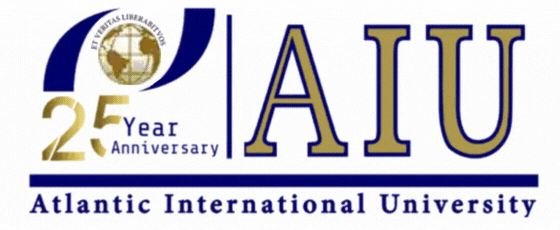- RESEARCHDistance Learning at AIU is enhanced by vast academic resources and innovative technologies build into the Virtual Campus: Hundreds of self-paced courses with video lectures and step by step lessons, thousands of optional assignments, 140,000 e-books, the Social Media & Networking platform allowing collaboration/chat/communications between students, and MYAIU develop students holistically in 11 areas beyond just academics.
- PROGRAMS OFFERED
- Areas of Study
- Courses and Curriculum
- Open Courses
- Register for a Program
- Associate Program
- Associate in Addiction Counseling
- Associate in Agriculture Food And Resources
- Associate in Anti Terrorism Security
- Associate in Behavior Analysis In Special Education
- Associate in Bioethics
- Associate in Climatology
- Associate in Cultural Theological Communication
- Associate in Culinary Arts
- Associate in Ecotechnology
- View all Associates Programs
- Bachelor Program
- Bachelors in Community Development
- Bachelors in Environmental Science
- Bachelor in Education (B.Ed, BS)
- Bachelors in Economics
- Bachelors in Entrepreneurship
- Bachelors in Financial Administration
- Bachelors in Human Resource Management
- Bachelors in Linguistics
- Bachelors in Nutritional Science
- Bachelors in Occupational Health and Safety
- Bachelors in Psychology
- View all Bachelor Programs
- Doctorate Program
- Doctor | of Biology (PhD)
- Doctorate in Business Administration (DBA, PhD)
- Doctor of Economics (PhD)
- Doctor of Electrical Engineering (D.Sc, PhD)
- Doctor of Finance (PhD)
- Doctorate in International Relations
- Doctorate in Information Technology (D.Sc)
- Doctor of Legal Studies (PhD)
- Doctor of Project Management (PhD)
- Doctor of Sociology (PhD, D.Sc)
- Doctorate in Sustainable Natural Resources Management
- View all Doctorate Programs
- Master Program
- Postdoctoral Program
- Postdoctoral in Animal Science
- Postdoctoral in Anti Terrorism Security
- Postdoctoral in Behavior Analysis In Special Education
- Postdoctoral in Bioethics
- Postdoctoral in Blockchain Technology and Digital Currency
- Postdoctoral in Business Management
- Postdoctoral in Cloud Computing
- Postdoctoral in Computer Engineering
- View all Postdoctoral Programs
AIU offers a wide range of majors in areas including the Arts, Business, Science, Technology, Social, and Human studies. More than 120 degrees and programs are available for adult learners at the associate’s, bachelor’s, master’s, doctoral and postdoctoral level. - VIRTUAL CAMPUS
Distance Learning at AIU is enhanced by vast academic resources and innovative technologies build into the Virtual Campus: Hundreds of self-paced courses with video lectures and step by step lessons, thousands of optional assignments, 140,000 e-books, the Social Media & Networking platform allowing collaboration/chat/communications between students, and MYAIU develop students holistically in 11 areas beyond just academics.
- ALUMNI
The world is YOUR campus!”, that is the message of AIU’s month magazine Campus Mundi. Hear the voices and see the faces that make up AIU. Campus Mundi brings the world of AIU to you every months with inspirational stories, news and achievements by AIU members from around the world (students and staff are located in over 200 countries).
Obstacles to Human Development
Challenges to Sustainable Development in Haiti
The document analyzes the challenges to sustainable development in Haiti, highlighting low literacy rates, political corruption, and inadequate civil society engagement. It emphasizes the need for inclusive policies that empower local communities and foster political awareness, drawing parallels with other nations that have successfully navigated similar obstacles to achieve progress.

The document provides a comprehensive analysis of the challenges facing sustainable development in Haiti, emphasizing the interplay between socio-economic, political, and cultural factors. It begins by establishing Haiti’s status as the poorest country in the Caribbean and one of the poorest globally, as highlighted by various reports, including those from the Haitian Institute of Statistics and Informatics and the United Nations Human Development report.
The analysis delves into the multidimensional nature of poverty, defining it not only in economic terms but also in relation to access to education, healthcare, and political rights. The World Bank’s definition of poverty as a “pronounced deprivation of well-being” is referenced, along with the Organization for Economic Co-Operation and Development’s perspective on the inability to achieve certain standards of well-being.
A significant focus is placed on the rural population, which constitutes about 45 percent of Haiti’s demographic. The document notes that nearly two-thirds of this population is considered chronically poor, suffering from food insecurity and exclusion from political processes. The lack of political engagement from rural communities is highlighted as a barrier to achieving the Sustainable Development Goals (SDGs), which advocate for inclusion.
The text further discusses the weaknesses of the Haitian state, which struggles to address the basic needs of its citizens, leading to increased dependence on international aid and the proliferation of non-governmental organizations (NGOs). The management of humanitarian aid, particularly following the 2010 earthquake, is critiqued for failing to effectively integrate urgent needs with long-term development strategies. This situation has resulted in a weakened state that is unable to fulfill its responsibilities, perpetuating a cycle of underdevelopment.
The document also addresses the lack of civil society engagement, asserting that successful public policy implementation requires the support of civil society organizations. It points out that the absence of a capable state and the prevalence of corruption hinder effective governance, as evidenced by Haiti’s ranking on Transparency International’s corruption index.
Moreover, the analysis highlights the low literacy rate in Haiti, which is below 62%, and the failure of both the state and civil society to provide essential education. This lack of education contributes to a deficit in political awareness and citizenship, limiting the ability of the population to engage in the democratic process.
In conclusion, the document argues that the combined failures of the Haitian state and civil society, along with the neglect of local populations, obstruct the path to sustainable development. It calls for a shift towards inclusive policies that empower local communities and foster a culture of responsibility and civic engagement, drawing lessons from other countries that have successfully navigated similar challenges. The analysis underscores the importance of addressing these systemic issues to enable Haiti to achieve its development aspirations and meet the SDGs.
Atlantic International University
Get to know the AIU experience
Contact Us Today!
We understand how busy adults do not have time to go back to school. Now, it’s possible to earn your degree in the comfort of your own home and still have time for yourself and your family. The Admissions office is here to help you, for additional information or to see if you qualify for admissions please contact us. If you are ready to apply please submit your Online Application and paste your resume and any additional comments/questions in the area provided.
Pioneer Plaza
900 Fort Street Mall 905
Honolulu, HI 96813
800-993-0066 (Toll Free in US)
808-924-9567 (Internationally)
808-947-2488 (Fax)
AIU Success Stories







Contact Us Today!
Begin Your Journey!
AIU’s Summer of Innovation and Growth gives you the ability to earn up to $5000 in tuition credit by completing free lessons and courses.
Whether you’re looking to acquire new skills, advance your career, or simply explore new interests, AIU is your gateway to a world of opportunities. With free access to 3400 lessons and hundreds of courses the ability to earn credits and earn certificates there’s no better time to start learning.
Join us today as a Guest Student and take the first step towards a brighter, more empowered future.
Explore. Learn. Achieve.
Degrees

Contact Us
Atlantic International University
900 Fort Street Mall 905 Honolulu, HI 96813 [email protected]
Quick Links
Home | Online Courses | Available Courses | Virtual Campus | Career Center | Available Positions | Ask Career Coach | The Job Interview | Resume Writing | Accreditation | Areas of Study | Bachelor Degree Programs | Masters Degree Programs | Doctoral Degree Programs | Course & Curriculum | Human Rights | Online Library | Representations | Student Publication | Sponsors | General Information | Mission & Vision | School of Business and Economics | School of Science and Engineering | School of Social and Human Studies | Media Center | Admission Requirements | Apply Online | Tuition | Faculty & Staff | Distance Learning Overview | Student Testimonials | AIU Blogs | Register for Program | Privacy Policy | FAQ



















